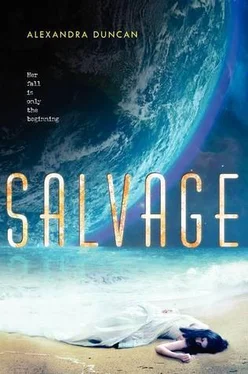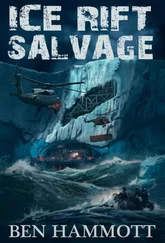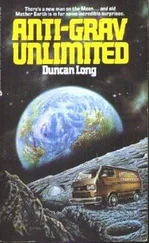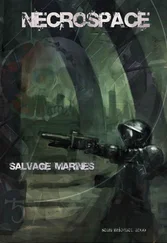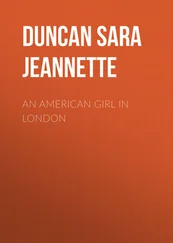“There’s a store inside.” She waves over her shoulder at the small building behind us selling tickets and cold juice. “You can buy some there.”
“Buy?” I frown. In the Gyre, everyone shared their water. If we were on our way back from the market and got thirsty, all we had to do was ask, and one of Perpétue’s neighbors would give us a drink. It was always warm and flat from boiling, but it was never something we worried over.
“We don’t need it cold or special or anything,” I tell the woman. “Just regular water.”
She raises her eyebrows and pulls off her glasses to give me a withering stare. “No such thing as free water, kid,” she says, and stalks away.
Her words hit me like a cold slap, and anger flares in my chest, sudden and ice hot. I grip the haft of Perpétue’s knife. I’m going to swing at her. I’m going to run her down and shove her face in the trickle of dirty water skimming the bottom of the trainway. I’m going to cut the strap of that shiny bag of hers and run off with the full bottle hanging from it.
Then the memory of the red-haired woman and the tea washes back over me. Perpétue comforting me in the ship’s hold. Perpétue on the ship’s ladder. Perpétue lost in the storm. All the fight goes out of me.
I let go of the knife. The sun is high overhead and there are no shadows. Sweat rolls down my back. The crowd still mills around the smartboard maps, but a few people have taken a raised footbridge over to a different platform, where a train waits with wide-open doors.
I grab Miyole’s hand. “Come on.”
I expect her to ask where we’re going, but she follows me mutely across the bridge. I don’t even glance up at the name of the next station gliding above our heads as we wedge in next to the window. It doesn’t matter where it’s going, as long as it’s away from here, away from that horrible woman and all that water held out of our reach. Besides, it’s cooler in the train cars than out on the platforms. We won’t notice our thirst as much.
The city closes in around us as we pick up speed. The buildings creep nearer to the trainway and then rise and rise so we can’t see their tops from inside the car. Hand-painted signs on the sides of buildings give way to smartboards and windows playing enormous images of smooth-skinned women with teeth as tall as Miyole. Every now and again, a break in the buildings lets in a blinding flash of sunlight.
We slow to pass through a crowded section of the city. People pack the broad avenue outside the window, most of them on foot, but some on horses. And then in the flow of bobbing heads, I spot a broad, gray animal face with great flapping ears. My mother started to see things when the virus took her. She would reach out, even when there was nothing there. Am I getting sick the same way? I close my eyes tight and open them again. The animal is still there. Its back rises level with our train car, and it holds its long, armlike nose in an elegant curl.
“Miyole.” I pick at her shoulder. “Do you see that?”
Miyole looks at it and shrugs. “It’s an elephant.”
An elephant. I remember a picture in one of Miyole’s tablet stories. I had thought it was imaginary, like the Void zephyrs or zebras. A canopied platform rests on its leathery back. A woman sits behind the animal’s ears, and a man, three children, and a silver-haired woman ride behind her.
The old woman beside Miyole glares at me and clears her throat. I’m stepping on the hem of her dress. I back away with an apologetic glance.
The train stops at another station. I know I should step off, look for water again, try to figure out where we are, but there are so many people, all of them packed in tight like fish. My legs feel too heavy to move. I can’t call up the energy it would take to edge my way through the crowd, much less pull Miyole after me, so I watch the unfamiliar station names glide along the windows. The world is getting bigger and bigger and I am shrinking in it.
Finally the buildings drop back from the trainway and the crowd thins. Clusters of man-tall pipes run alongside our window for a time, and then veer off into a different part of the city. Light still fills the sky, but it has a tarnished look to it, like old metal. The day is nearly spent. A hill rises into view. Houses and naked pipes crawl up all of its sides but one, a sheer face that drops down to rooftops below.
The train glides to a stop.
“End of transit line,” the overhead voice tells us.
All of the remaining passengers file to the exits. I look down at Miyole, who has fallen asleep in her seat, her head slumped against my shoulder. I wish I could do that. Lie down and drop out of the world for a space. I glance around. The train is completely empty now, the doors standing open.
My eyes ache. My body is so heavy I would swear Mumbai has its own, more powerful gravity. I want Perpétue. I want her to tell me, “Don’t worry, fi,” and find my modrie for me so this can be over. I want Iri or, better, my own long-gone mother to pull me against the warmth of her chest. I want Luck to stroke my hair and tell me he’ll fix everything.
But he won’t. None of them will.
“Miyole,” I whisper. “Time to keep moving.”
We walk out onto the train platform. The train sighs behind us, waves of heat rolling off its metal skin. Across the street, shops selling tea and long bolts of lightweight cloth pack in close to the road. Reddish stains color the bottom of the white plaster walls, as if the foundations had been dipped in a dye bath. Men and women shuffle along, or else thread their way carefully through the crowd atop jingling two-wheeled machines and the occasional horse. Maybe here we’ll have more luck with water.
I spot a smartboard near a cluster of benches and a stunted tree in a concrete pot. I squint at the board. Scratches cloud its face, and the low angle of the sun washes out the letters and lines on its display.
A man in a light blue uniform makes his way down the platform toward us, stopping every few strides to check inside the empty train cars.
He takes in our clothes before he speaks. “You girls are waiting for the next train?” His voice is buoyant and rolling.
I nod.
“We’ll not be leaving for another two hours.” He waves a hand at the train. “Maintenance stop.”
I stare at him dully. Maintenance stop? I know what those two words mean, but my mind won’t put them together. All I can do is stare at the badge on his shirt, glinting in the late sun.
“Why don’t you go find some dinner?” He smiles. “Come back in a few hours when the line is running again.”
My despair must be showing on my face, because his smile dissolves. “Are you lost? How long have you been traveling?”
“Since the morning,” Miyole pipes up, her voice a soft rasp.
He sighs. “You didn’t bring extra money for water, did you?” He shakes his head and fumbles at the water bottle clipped to his belt, holds it out to us, annoyed. “Here.”
I snatch it up and hand it to Miyole. She drinks long and deep, a little trickle running down the side of her chin. At last she pulls back with a gasp for air and hands the bottle over to me. The water is cool—perfect—almost sweet. I drink and drink until the last drop is gone.
The look of annoyance is gone from the train man’s face, replaced by a furrow of concern between his brows.
I hold the empty bottle out to him. “Thank you, so.”
Читать дальше
